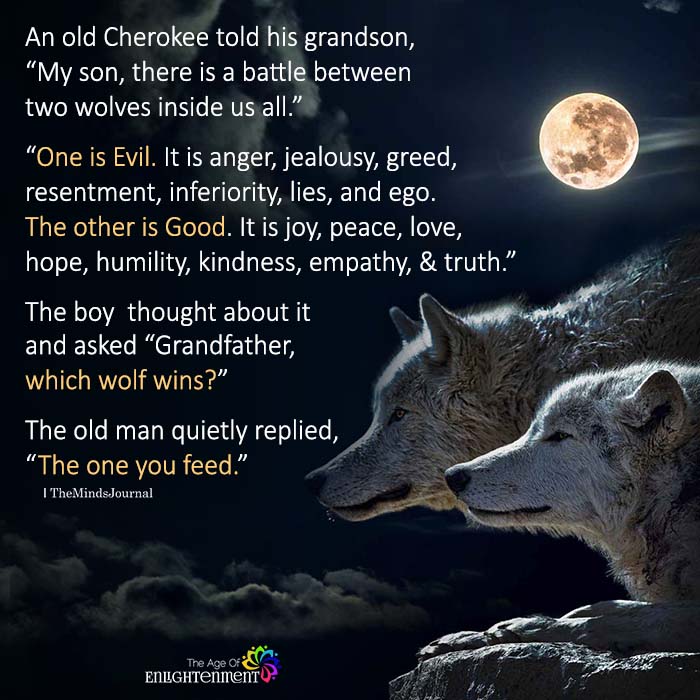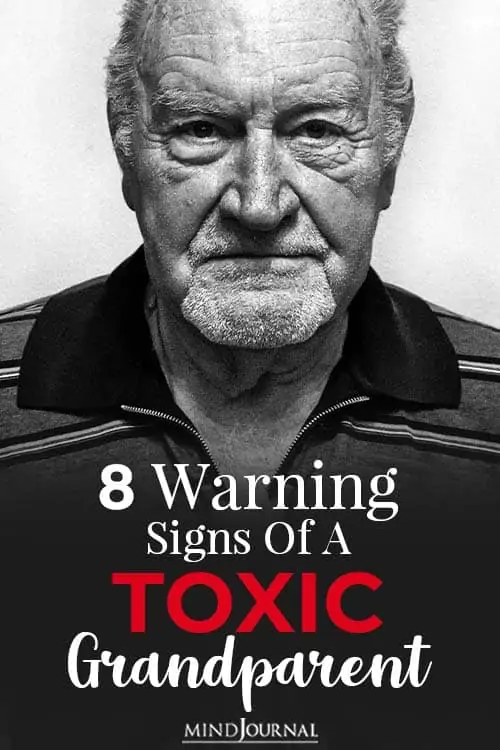Usually, we have a heartwarming image of a grandparent. However, grandparents can sometimes be very toxic towards their grandchildren, and no matter how disturbing that might sound, it turns out to be true in many families. Read on to know if you have toxic grandparents.
Realize that a grandparent can be toxic
The relationship a child shares with their grandparents is one of the most special bonds that influences children even in their adulthood. Sadly, some grandparents can be too toxic for their own grandchildren. They can negatively influence and manipulate their grandchildren and use this as an opportunity to create never-ending drama in the family.
A toxic grandparent can not only be self-serving and controlling, they can also be harmful to your kids and your family. However, it can often be difficult to realize that one of your parents or in-laws is spreading their toxicity into the lives of your children.
Read also: Understanding The Power And Control Wheel For Child Abuse
The relationship between a toxic grandparent and their grandchildren can be stressful, draining, and complex, believes hypnotherapist and life coach Claire Jack, Ph.D. She explains “Grandchildren, potentially, make for great narcissistic supply – new, innocent little people who can be molded to meet the grandmother’s needs.”
The moment you ignore and directly or indirectly permit your toxic parent to manipulate your children, you are increasing their chances of facing the same emotional abuse you did when you were a child. Toxic grandparents will demand unlimited access to your children, they will violate your parental boundaries and may even use your children against you.
However, if you try to protest it, they will outright hate your children, which can affect the emotional well-being of your kids.
If you think your children have a toxic grandparent, then the first thing you need to do is be aware of the situation and learn to spot the warning signs. Once you can identify the signs of a toxic grandparent, you can take steps to prevent further damage.
Signs of a toxic grandparent
Here are some signs of a manipulative, narcissistic and toxic grandparent that you need to watch out for –
1. They question your parenting skills.
Regardless of how hard you may try, you will never be considered a good parent by narcissistic grandparents. They will constantly undermine your parenthood and act as if they know better than you about raising a child.
They will criticize your decisions and efforts. They will disrespect and violate your routines, boundaries, and rules & instead create constant drama & chaos. Moreover, as such behavior can appear to be in favor of your children, the little ones may grow increasingly fond of the toxic grandparent which can create further challenges for you.
Read also: 25 Effective Parenting Rules For Mothers With Sons
2. They criticize your child.
A toxic grandparent doesn’t really love or care about their grandchildren. The children are nothing but a part of their narcissistic supply. This is why they often tend to belittle, humiliate, and insult their grandkids.
They may also ignore the children, forget their birthdays and use them for their own gain. They may even use threats or physical discipline as well. Due to their manipulative, judgmental, and critical nature, toxic people may criticize children even when they don’t really want to. Their toxicity will eventually start to affect the child’s development and may even lead to serious mental health problems.
3. They manipulate you & your children.
Toxic grandparents can go to any length to get what they want and that includes manipulating your family. They will never hesitate to guilt trip you in order to make you concede. You or your partner may have experienced their manipulative tricks as a child, but now as a grandparent, they will introduce a host of new strategies to make you feel guilty about taking a stand.
Narcissistic grandparents are master manipulators who know exactly how to play with your and your children’s emotions to fulfill their own wishes. Such behavior can lead to low self-confidence and self-esteem in your children.
4. They try to control your parenting decisions.
A toxic grandparent will meddle and interfere with your decisions and efforts as a parent. They will manipulate and break your rules with your children, set up new rules and may even criticize or insult you before your own children.
They will act in a controlling manner as if they have complete authority over you and your children and believe that they are entitled to making the final parenting decisions.
Although it is okay for you to disagree with your parents or in-laws when it comes to raising your children right, they should never encroach on your parenting rights. They should never disregard your authority over your children and establish their own.
5. They play the victim card.
This is another form of manipulation used by narcissistic grandparents. When all other manipulative strategies prove ineffective, they will pretend to be the victim and make you seem like an abusive, toxic person.
Victim playing is typically an attention-seeking or manipulative strategy used to control the emotions and behaviors of other people. Whether done deliberately or not, it can make you feel stressed out, frustrated, selfish, and guilty. Not only can this affect your emotional and mental health, but it can also influence your family dynamics and your child’s mental health.
Playing the victim enables toxic grandfathers and grandmothers to hide their bad behavior, do whatever they feel like and avoid any responsibilities.
Read also: 23 Signs You Have A Victim Mentality (And How To Deal With It)
6. They are masters at playing favorites.
Most parents and grandparents tend to favor one child over another. However, when a grandparent deliberately favors one grandchild then it can lead to toxic relationships in the family.
Narcissistic grandparents will spend more time with their favorite grandchild, abuse or discipline them less, and give them more privileges and affection. However, this can be mentally and emotionally devastating for the other child.
Best-selling author and mental health expert Gregory L. Jantz, Ph.D. explains “Children are not stupid. They can sense when this type of inequity exists. They can sense it even when the parent does not. Desperately they attempt to figure out what is wrong with them. The reasons they come up with can cause lifelong damage to self-esteem.”
Toxic grandparents tend to compare the children and clearly establish one as better than the other. This can make the other child feel that they are not good enough, a tendency which can be carried into adulthood.
7. They use money to “buy” love.
Most children are often spoiled by their grandparents with constant gifts. But this is usually done out of genuine love and affection. However, a toxic grandparent may use their finances to control and abuse your children.
Narcissists are incapable of truly loving someone, even if it’s their own grandchildren. Due to their limited range of emotions, they may not emotionally connect with your kids. And due to their lack of genuine love and care, they believe they can buy love with gifts and financial aid.
They may use their money to constantly buy gifts or toys for your kids in an attempt to be loved by the little ones. For them, even gift-giving is a manipulative strategy.
They may not ask your permission or even ignore your opinions before buying a really expensive gift, like an iPhone. Not only this violates your parental boundaries, it is also an attempt to outshine you. Moreover, this creates a negative impact on the children and sends them the wrong message. This is undoubtedly a form of financial abuse.
8. They want to be favored.
They want to be the best grandparent even if they do not deserve the title. If they ever get any hint that they are not loved, liked or favored by the other members of the family, they may behave and react in toxic, passive-aggressive ways.
As they feel entitled, they tend to have a grandiose attitude. They will always demand a perfect relationship from their children and grandchildren even when they have not invested themselves into these relationships. They expect everyone to be grateful for anything they do for their grandchildren and want to be a part of every small decision-making process of your family.
They have no problem invading personal boundaries and will enforce their rights to manipulate you and your children.
Read also: Are Your In-Laws Driving You Nuts? 5 Ways to Cope
Dealing with a toxic grandparent
It can often be tricky to deal with narcissistic grandfathers or grandmothers, especially if your child is attached to them. Here are a few coping strategies you can use to deal with toxic grandparents-
1. Identify their toxic patterns.
Once you have learned to recognize the signs of a narcissistic grandmother or grandfather, you need to spot their abusive and manipulative patterns. Either you or your partner will be aware of their tricks and need to take steps to protect your child from them.
2. Establish strong boundaries.
Irrespective of how much they try to intrude, set & maintain healthy and clear boundaries as a parent. Let them know that when it comes to your children, your rules must take precedent. Even if they fail to follow your rules, you need to stand your ground and maintain your boundaries.
Read also: How Healthy Boundaries With Your In-laws Will Make Your Marriage Stronger
3. Do not allow them to affect you.
Narcissists know exactly how to get under your skin and trigger a reaction from you. This gives them the power to manipulate and control you. If you react the way they want you to, then they will have you trapped in their toxic cycle.
Hence, it is crucial that you learn to overcome the triggers, control your reactions, and don’t let them upset you or your loved ones.
4. Communicate openly.
Talking to the toxic grandparent honestly and openly can also help at times. Inform them how their behavior and actions are affecting you and your children. Openly talking to them will help them realize the consequences of their narcissism and may prevent them from being excessively manipulative.

5. Listen to them.
Actively listen to your parents or in-laws and try to understand their perspective and concerns. Try to understand their point of view and help them understand the importance and meaning of your decisions. It is also important to appreciate and be grateful for their love and affection toward your children.
6. Deal with it as a family.
Talk to your partner and your children about how the narcissistic behavior of a particular grandparent is affecting your family. Do not pretend that things are “okay” and help your children understand narcissism. Develop a strategy as a family to deal with the situation.
7. Go no-contact.
If all else fails, then going no contact may be the final and most effective option to deal with a toxic grandparent. However, when it comes to family, cutting your parents or in-laws out of your life can be extremely difficult.
This is why it is often best to restrict communication for some time. Limiting communication and exposure to your kids can help you to restore and reintroduce order and rules in your family. You may also opt for supervised communication as well.
Build a stronger family
Regardless of how narcissistic a grandparent may be or what course of action you decide to take to deal with them, you need to remember that they are still part of your family. As long as you are aware of their toxic patterns, set healthy parenting boundaries, don’t let them affect you, and keep your children safe from their manipulation, you can allow them to be a part of your children’s life.
It is only by openly communicating your concerns with your parents or in-laws and informing your kids about narcissism, you can build a healthier, stronger family for both the grandchildren and the grandparents.










Leave a Reply
You must be logged in to post a comment.